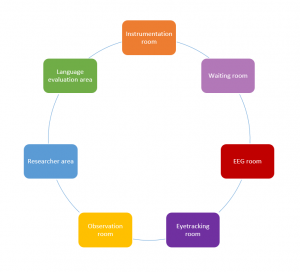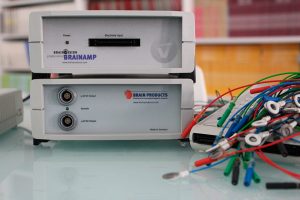Experimental Linguistics Laboratory
The Experimental Linguistics Laboratory is equipped with an instrumentation room, a language evaluation area, an area of researchers, an observation room, an eye tracking room, an EEG room and a waiting room, as can be seen in the following chart:

The incorporation of different techniques in this unit for the investigation of language from the perspectives of the speech production and auditory perception and the processing, through the registration of cognitive evoked potentials by the use of EEG and the ocular registration ensures an integral experimental approach to the languages operation with an important projection to the fields of scientific-technical investigation and knowledge transference. In this sense, this equipment pretends to offer scientific-technical carrier to the design of collaborative works in the field of language operation, with multiple implications in different fields of the Applied Linguistics, such as language technologies, language teaching, strategic communication, forensic linguistics or clinic linguistics, among others.

The Brainamp 64-channel electroencephalography system offers a wide range of possible application areas in the neurophysiologic investigation of language. It is allocated to the data collection related to the normal and pathological linguistic activity. The ERPs or discrete event-related potentials, taken by EEG, allow to record the brain electronic activity via electrodes placed, in standard way, above ground of the scalp. They are very useful in the field of the studies about language, as the use of such tool allows us to analyse brain patterns associated to specific linguistic tasks, thanks to the high temporal resolution of this technique, since they report in real time about the cortical electrical activity that is produced during the processing itself of the information. Therefore, this equipment is linked to the current lines of investigation and training developed by this Institute, such as comprehension analysis and the normal and pathological linguistic operation, the critical assessment of the current models of the linguistic processing in view of the studied pathological cases, the inquiry of neurocognitive processes contributing in the lexical information processing from the individual, the enlargement of the experimental investigation and the search of neurological correlations or the training of the qualified technicians in the managing of EEG for the investigation of ERPs applied to normal and pathological language.
![]()
Regarding the eye tracking system (Hardware Tobii Spectrum 1.200Hz and Software Tobii Pro Lab Full Edition), its incorporation in this unit for the language investigation through ocular register, allows the measure of flow of information-time reaction or fixation, originated by the different language phenomena. This kind of register represents a crucial biomarker in order to investigate cognition aspects such as attention, memory and language.
The combination of EEG techniques and ocular register makes the collection of objective results possible for the design of new explicative models of the linguistic processing of interest for both the evaluation and rehabilitation of language.

